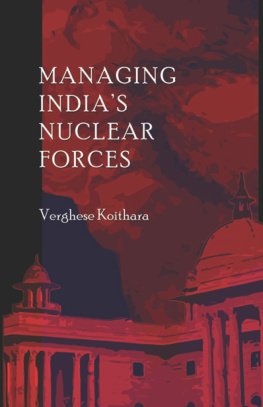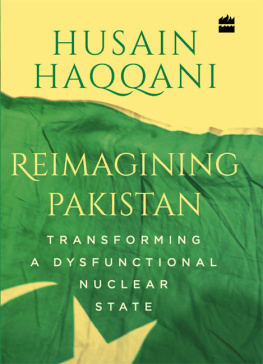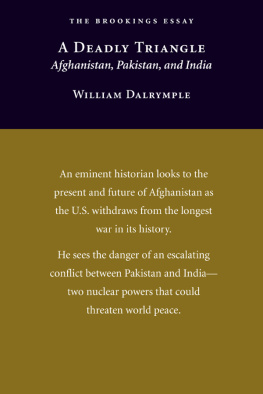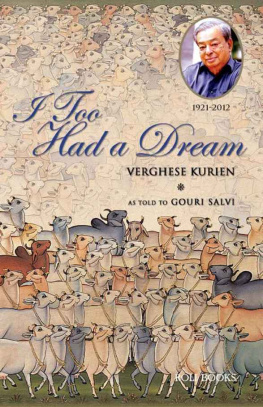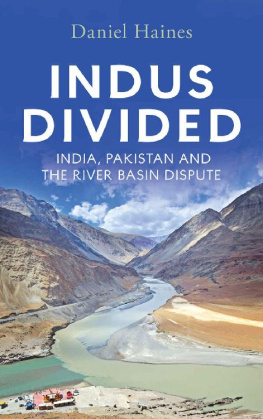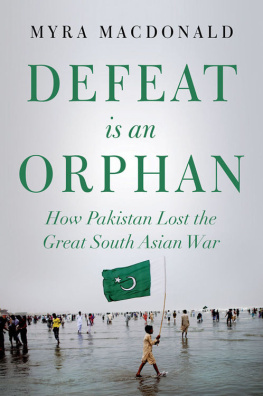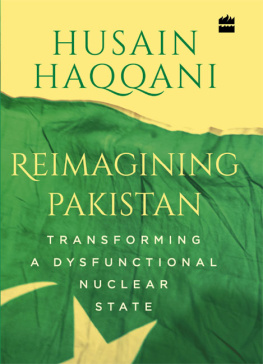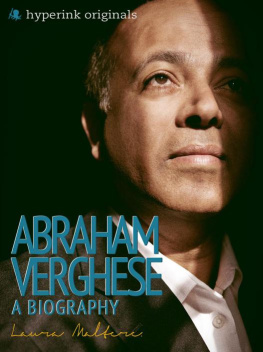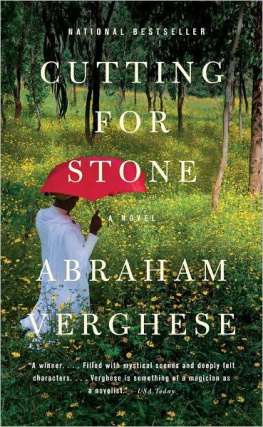

Published by
Rupa Publications India Pvt. Ltd 2016
7/16, Ansari Road, Daryaganj
New Delhi 110002
Copyright Rahul S. Verghese 2016
The views and opinions expressed in this book are the authors own and the facts are as reported by him which have been verified to the extent possible, and the publishers are not in any way liable for the same.
All rights reserved.
No part of this publication may be reproduced, transmitted, or stored in a retrieval system, in any form or by any means, electronic, mechanical, photocopying, recording or otherwise, without the prior permission of the publisher.
ISBN: 978-81-291-3598-8
First impression 2015
10 9 8 7 6 5 4 3 2 1
Typeset by SRYA, New Delhi
This book is sold subject to the condition that it shall not, by way of trade or otherwise, be lent, resold, hired out, or otherwise circulated, without the publishers prior consent, in any form of binding or cover other than that in which it is published.
Contents
Preface
And ye shall know the truth, and the truth shall make you free.
St John 8:32
A nation in denial, Pakistan is in a state of deep crisis. Its fledgling, born-again democracy is threatened by internal dissension, self-made jihadi extremism, provincial rivalry and the looming presence of an army that remains a state within the state. Yet, there are emerging and increasingly articulate forces that recognize that Pakistan must reimagine and reinvent itself from the Indian other to restore the identity it foolishly abandoned at birth. Muhammad Ali Jinnah so wanted to distance his nation from the parent state that he abandoned its soul and defined it emphatically, solely and negatively as not IndiaIndia being a permanent, existential Hindu enemy.
His famous 11 August 1947 speech to the constituent assembly of Pakistan revealed his utter confusion. It was virtually censored and later withdrawn by his own government, as he had not merely repudiated the two-nation theory on the basis of which Pakistan had been born but had also, astonishingly, confessed in plain terms that he had little to say about the future of Pakistan as he had not thought about it sufficiently!
The denial by Pakistan of its history, geography and culture has caricatured reality. Pakistan has proclaimed itself an Islamic state, but has defined Islam in narrow sectarian terms. It has moved from being Muslim to becoming increasingly radical, trying hard to establish that it is Muslim enough. It has dedicated itself to something called the ideology of Pakistan and made acceptance of this ideology a part of the oath of office of all leading functionaries and members of the legislative assembly (MLAs). Such actions areand theres no mild way of putting itpure gobbledygook.
Based on this, official Pakistani textbooks in state schools distort, omit and reconstruct the countrys social and political history in an extraordinarily brazen manner. The Jinnah Institute, Islamabad, reviewed these textbooks in 2012 and described them as filled with a curriculum of hatehate of India and of Hindus. To reinvent itself, Pakistan at one time tried to describe itself as West Asian and contemplated a confederation with Iran and Turkey in the abortive USA-sponsored Regional Cooperation for Development (RCD). It joined the Central Treaty Organization (CENTO) or the Baghdad Pact and has since been the sword arm of a number of West Asian, especially Sunni monarchies, crowning this position with possession of the Islamic bomb.
Having denied its identity ab initio, Pakistan has been a state in constant denial ever since. This is documented in cast-iron terms in the record of Indo-Pakistan diplomatic correspondence between 1947 and 2007.
War, tensions and cross-border terror have alternated with talks to manage or prevent conflict and seek a peaceful settlement. There have been such contrapuntal exchanges since 1947. India too has erred on occasion. But it has, by and large, sought to be accommodative and reconciliatory. It is not irredentist. It makes no claims on Pakistan. But Pakistan, alas, has an undefined ideology and ideological frontiers to defend. For it, Kashmir is the core issue, together with the Indus waters. Everything else is hostage to a settlement of these two issues on its terms, irrespective of the UN (United Nations) Resolutions on Jammu and Kashmir (J&K), now effete, and the Indus Waters Treaty.
Kashmir and the Indus waters are, however, far from being the core issues. They are consequences, not causes, of the endless stalemate. The real core issue is Pakistans lack of identity or anchorage. Edward Lear, in his collection, Complete Nonsense, asks, Who, or why, or which, or what,/ Is the Akond of Swat? The same question may be addressed to Pakistan. The last akond, Minagul Aurangzeb, was incidentally in school with me in united India and remained a loving friend till the end. We often met and exchanged greetings, the last time on the occasion of Eid in August 2014. He was an ill man and tragically died a day later. With men and women like Aurangzeband there are many othersall proud Pakistanis, but dedicated to secularism, peace and cooperation with Indiawe shall overcome.
Pakistan has also to come to terms with its true Islamic heritagea soft, humanistic, syncretic, Sufi-infused Islam, rather than the narrow, revivalist and fundamentalist Wahhabi Islam that has been imposed on its people as the ideology of Pakistan. World Islam is in crisis. It is sorely in need of another renaissance imbued with the spirit of ijtihad (or innovation, and an independent or original interpretation of problems not precisely covered by the Quran, Hadith and Ijma), which the Prophet himself ordained and which, not so long ago, heralded a glorious era of Islamic civilization, science and culture.
It is argued by some of the severest Pakistani critics that Pakistan has been there for sixty-eight years and is here to stay. It cannot be wished away. True enough. But it is, with Israel, the only ideological state in the world and continues to be chained to an ideology that is confused, illiberal and ill-suited to a modern state. This is truly Pakistans core issue.
India cannot afford to sneer at or stand aloof from such an inference. It must assist in change. This is the challenge. Even incremental success could be transformative. If the right efforts are made, the issues of Kashmir and waters could be resolved.
I have cited many foreign authors and responsible Pakistani sources, so as not to make it possible for anyone to dismiss this text as an Indian rant and pure propaganda. Indians, too, must know the truth, and understand that India is arguing and acting from a position of strengthso that this nation can make those concessions that are necessary.
Peace has its victories, no less renowned than war.
HISTORICAL CHURNINGS
Blood and Mistrust
The Indian unions reluctance and structural inability to communicate inhibits governance in the country. For truth to prevailas the national motto, satyameva jayate demandsthe facts must be known in a timely, complete and objective manner. It is cause for celebration, therefore, that much archival material from the official records of Indo-Pakistan relations has been compiled in collaboration with the public diplomacy division of the ministry of external affairs.
Gaps remain and not everything has been placed in the public domain. Many official papers have remained in private hands; the few deposited in the Nehru Memorial Museum and Library find a place in the volumes edited by Avtar Singh Bhasin. Considerable material has otherwise come to light over the years through memoirs and other sources, Indian and foreign. I have cited some of these to flesh out the Indo-Pakistan story. Yet, there are interesting nuances and nuggets in the present narrative that offer a better and deeper insight into the anxieties, hostilities, mistrust, hopes and yearnings that have gone into shaping what has been a tormented relationship between India and Pakistana relationship that awaits healing four generations after the huge trauma of Partition, one of the greatest tragedies of human history.
Next page

